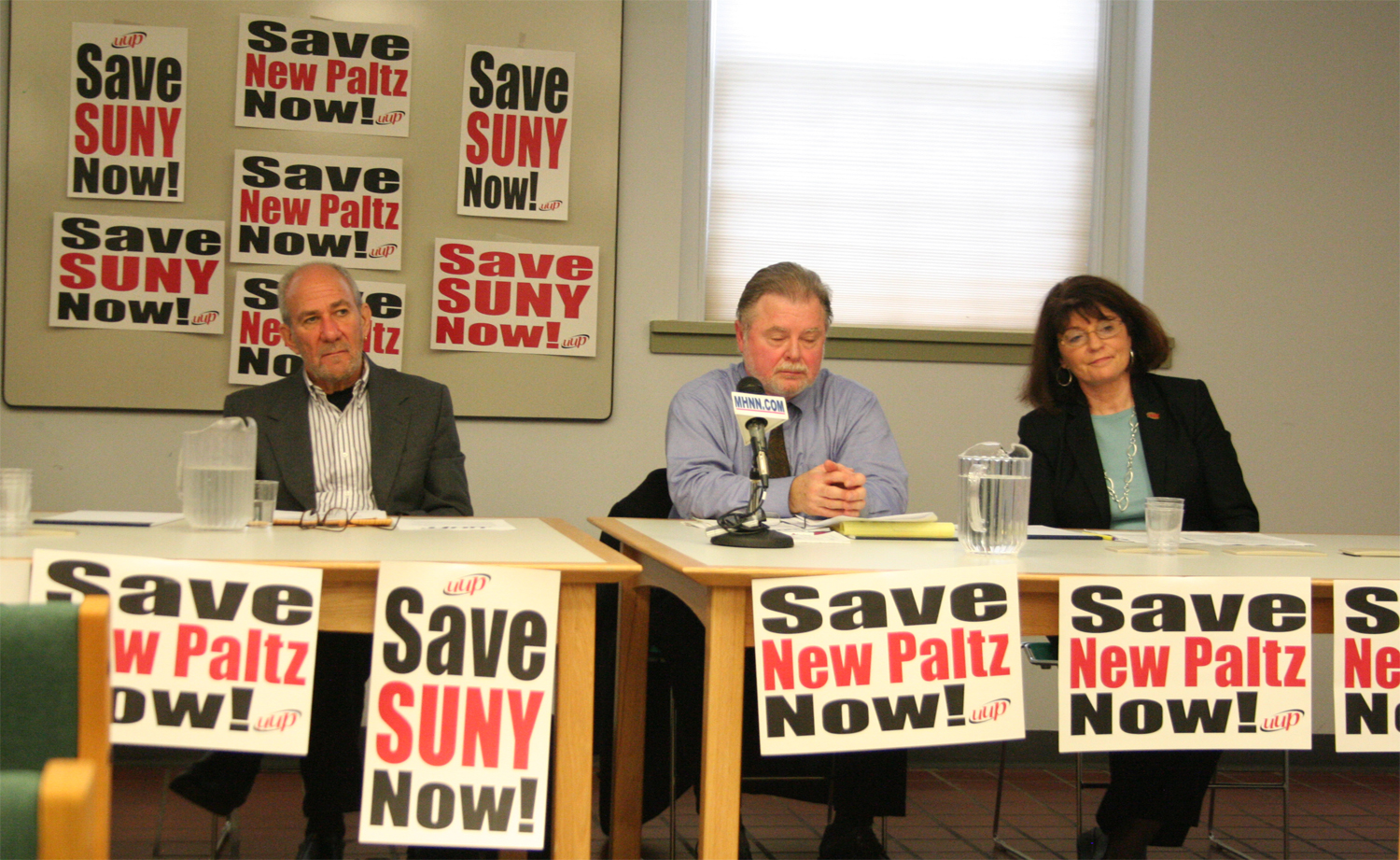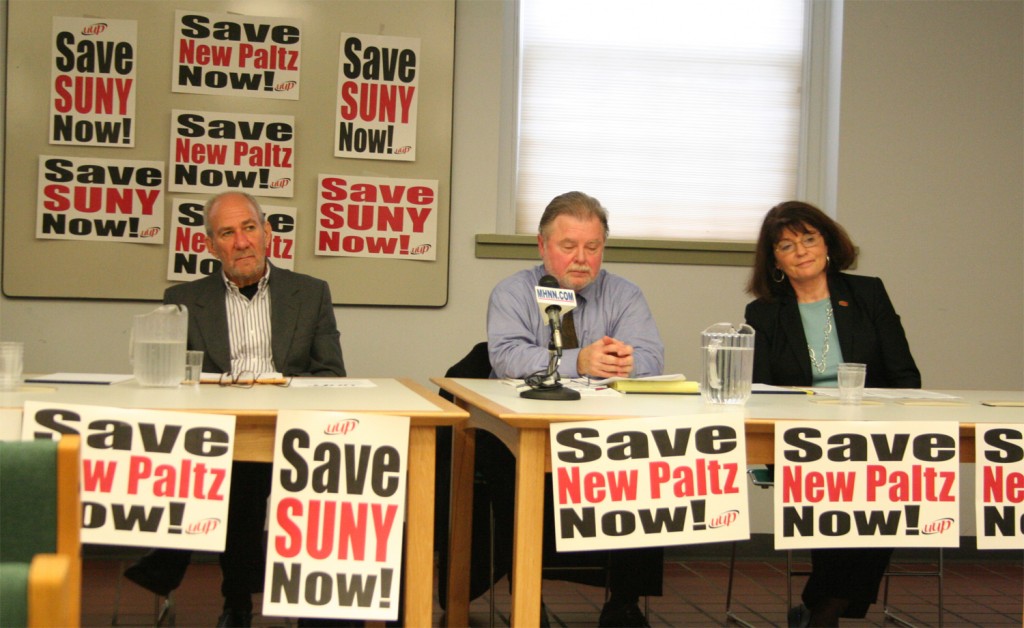

Members of the SUNY New Paltz chapter of the United University Professions (UUP) recently called for college administrators to utilize reserve funds in order to save faculty positions and curb cuts that could be introduced as the college copes with a $3.2 million deficit.
New Paltz UUP Chapter President Richard Kelder and Vice President for Academics Peter Brown were joined by the secretary of the state branch of UUP, Eileen Landy, and other union members last week when they released their official statement regarding the budget planning process. In their seven-point statement, UUP members said administrators should do everything in their power to avoid elimination of programs and personnel as they take suggestions and make decisions on how to reduce the college’s economy in light of the shortfall.
Kelder said cuts in state support have led to academic programs being phased out and jobs to be lost at schools like SUNY Albany and SUNY Geneseo, and he hopes similar choices will not be made at SUNY New Paltz.
“Public higher education is a public good, and it is under attack,” Kelder said.
Brown said the school could keep “every single program and employee here” if they used millions of dollars in reserve funds stored in over 400 accounts.
Though he said he does not know how much funding is available and if that money could legally be used, Brown said the time to use “rainy day” funds for emergencies is now.
“It’s not only raining, it’s pouring,” he said.
However, Vice President of Finance and Administration Jackie DiStefano said cash balances and all related revenue and expenditures are maintained in individual accounts for separate activities and purposes to comply with certain policies and mandates.
DiStefano said administrators believe UUP members and others are focusing on the cash balances that exist at a given point in time in a myriad of accounts that comprise the school’s Income Fund Reimbursable (IFR) Fund, State University Tuition Reimbursable Account (SUTRA) Fund, the SUTRA Overflow Fund, and the Core Instructional Budget Stabilization Fund.
Each of these funds serves specific purposes. DiStefano said administrators feel that using these funds as a long term solution to the budget imbalance would be “short-sighted.”
“We respectfully disagree with the union’s opinion that cash in every IFR and SUTRA account should be used to ‘stabilize’ our core instructional budget,” she said. “[It’s] fiscally irresponsible.”
According to DiStefano, the UUP members are referring to the $6.2 million in central cash balances available in the IFR and SUTRA funds that are managed in accordance with SUNY policies, New York State finance law and the Office of the State Controller regulations. All accounts also have a campus manager and signatory.
The SUTRA fund is a “special fund” dedicated to campus operations funded from and in support of tuition revenue collected from our summer session programs, school of education contract courses and fees received for students to participate in the overseas academic programs, DiStefano said. She also said the IFR fund is a self-supported fund dedicated to specific campus operations and activities and funded from revenues generated by these programs and student fees. These funds are spent in support of the specific purpose for which the revenue is generated, she said. IFR accounts include technology, course, health, application and late payment fees, among others.
Brown cited some IFR accounts as being earmarked by administrators for certain purposes, who he said would “rather see us cut personnel” than use these funds. He said he feels administrators should be more forthcoming about how these funds can be used and how much money is available.
“This information should be made public,” Brown said. “There are a number of ways these funds are used, but this is not totally clear to us.”
But DiStefano said students have a right to have those funds designated for the purposes they were told they were for, and they should not to be diverted into the college’s core operating budget.
The administrator said members of the campus community should remember that these kinds of cash reserves are available “one time” in that once these funds are spent, they are gone and without replenishment.
“It is not a source of cash that can provide a sustainable or ongoing ‘plug’ in the gap between revenue and expenses. And as our revenue continues to diminish, so does our ability to generate reserves,” DiStefano said. “We must take action to reduce our expenditures.”
The level of these balances is reviewed by the Middle States Commission as part of the fiscal component of the reaccreditation process that is underway at SUNY New Paltz. DiStefano said a review of guidelines, policies and procedures from other educational and business sources, including the National Association of College and University Business Officers and the Governmental Financial Officers Association in conjunction with guidance from independent auditors and bond rating agencies suggest that an appropriate level of unrestricted net cash reserves would be 25 percent of operating expenses or the equivalent of three months of expenses. If this percentage were to be applied to SUNY New Paltz operating expenses, DiStefano said a reserve of approximately $18 million should be maintained.
DiStefano said administration does not hold excess cash balance that can be spent without great thought, and that heavy considerations should be weighed when deciding if dipping into this funding is necessary.
“Maintaining adequate reserves is essential to establishing financial stability,” she said. “It is critical that a campus maintain adequate reserves to ensure its long-term financial viability and the sustainability of the programs we provide.”
However, members of the union said they feel that because state officials have decided not to invest in the future of public education, a serious situation affecting the future of SUNY students developed and this funding should be considered.
“SUNY is being attacked across the state,” Landy said. “New Paltz is one symptom of a pretty bad disease.”
Members of the union at SUNY New Paltz will be sending a letter to Interim President Donald Christian with questions and concerns regarding the budget planning process, which was signed by multiple departmental chairs and faculty members. Administrators said the campus community can log on to budget.newpaltz.edu throughout the academic year for updates.
